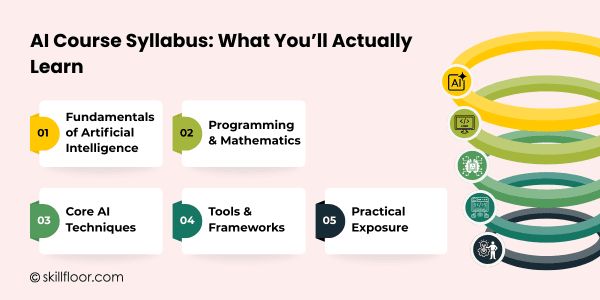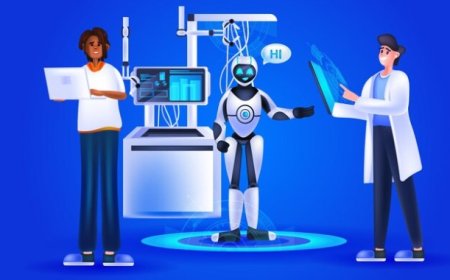Artificial Intelligence Course: Syllabus, Duration, Fees & Career Scope
Unlock your career potential with an AI course. Explore syllabus, duration, fees, and career opportunities with Skillfloor’s pro AI professional certifications.

Did you realize that the majority of top jobs nowadays require data or AI skills? It's simple to feel like your skills are becoming dated when looking through job postings. AI is no longer limited to tech companies. It's transforming marketing, healthcare, finance, and many other industries, opening up new opportunities for those who are willing to learn.
This is where an AI course comes in. Not just any course, but one that gives you real-world information, practical experience, and accredited certificates. Selecting the right AI course can have a significant impact on the next ten years of a professional's career.
At Skillfloor, we understand this urgency. Our AI programs are designed to help learners upskill, get certified, and grow their careers, making the leap from uncertainty to opportunity seamless.
In this blog, we will explore the syllabus of an Artificial Intelligence course, covering key topics that will give you a solid foundation in AI.
What is Artificial Intelligence?
Artificial intelligence (AI) refers to a machine's ability to exhibit human-like thought, learning, and problem-solving capabilities. It supports computers' comprehension of facts, decision-making, and gradual improvement. These days, AI is utilized in voice assistants, mobile apps, search engines, and many more everyday products.
AI is more than just advanced machines or robots. It discreetly operates in the background of finance, healthcare, retail, and even education. AI is making labor faster, smarter, and more accurate for both individuals and enterprises. Examples of this include video recommendations and early disease detection for physicians.
Why Learn Artificial Intelligence?
One of the most desired skills in the worldwide job market is artificial intelligence. This is why mastering AI has the potential to transform everything:
-
High-Demand Jobs: Businesses in a variety of sectors are looking for AI specialists to automate procedures, evaluate data, and develop clever solutions.
-
Diverse Applications: Healthcare, banking, robotics, e-commerce, autonomous vehicles, marketing, and many other industries employ AI.
-
Future-Ready Skills: Understanding AI keeps your profession relevant for the next ten years and helps you stay ahead in the quickly changing digital industry.
-
High Salary Potential: Due to the tremendous demand from businesses and the lack of qualified people, AI professionals are among the highest paid in the tech sector.
-
Global Career Opportunities: Because artificial intelligence skills are in high demand globally, you can work remotely or with startups or multinational corporations.
-
Innovation & Problem-Solving Power: AI makes it possible to develop intelligent systems, find solutions to practical issues, and produce cutting-edge goods that have an influence on millions of people.
Learning AI improves your employment possibilities and gives you the tools you need to use technology to address problems in the real world.
Types of AI Courses Available
There are several methods to select an Artificial Intelligence course and develop skills for future-ready employment today, depending on your objectives and background:
-
Certificate Courses: Skillfloor offers short-term certification courses that concentrate on the fundamentals and assist beginners in rapidly developing strong foundational skills.
-
Diploma/Advanced Courses: Advanced and diploma programs provide intermediate-level instruction with hands-on projects, assisting students in developing skills that are relevant to the workplace.
-
Degree Programs: B.Tech and M.Tech degree programs offer in-depth instruction, theory, and real-world experience for developing long-term professions.
-
Online Courses: Online courses provide students with flexible learning options, enabling them to balance job and personal obligations while studying whenever and wherever they choose.
There is an AI course that fits your objectives, time constraints, and professional aspirations, regardless of your level of experience.
AI Course Syllabus: What You’ll Actually Learn
Let's face it: When professionals enroll in AI courses, they often feel confused due to unclear or unstructured content. A good program, such as Skillfloor's AI certification course, guarantees that each module integrates theory and practice and builds upon the previous one.
1. Fundamentals of Artificial Intelligence
a. Introduction to AI and Its Real-World Applications
The subject defines artificial intelligence and describes how machines can carry out human-like tasks, including practical applications like automation, fraud detection, chatbots, recommendations, and healthcare systems.
b. History and Evolution of AI
This section describes the history of artificial intelligence, its significant turning points, and its development from rule-based systems to the cutting-edge machine learning and deep learning technologies of today.
c. Types of AI: Narrow AI, General AI, and Superintelligence
The three varieties of AI—narrow AI for certain tasks, general AI for intelligence comparable to that of humans, and superintelligence, a future idea beyond human capabilities—are explained in this article.
2. Programming & Mathematics
a. Python or R for AI Development
The Python or R programming languages used in AI development are taught in this course, assisting students in creating programs, managing data, creating models, and effectively automating intelligent tasks.
b. Linear Algebra, Probability & Statistics
Vectors, matrices, probability, and statistics are among the fundamental mathematical ideas covered in this part that are necessary to comprehend data, train models, and assess AI performance.
c. Calculus for Understanding Algorithms
This topic describes how calculus reduces errors, modifies parameters, and enhances model correctness during training to optimize machine learning algorithms.
3. Core AI Techniques
a. Machine Learning: Supervised, Unsupervised, and Reinforcement Learning
This article describes how supervised, unsupervised, and reinforcement learning techniques are used by machines to learn from data in order to make predictions, find patterns, and make better judgments.
b. Deep Learning: Neural Networks, CNN, RNN, Transformers
Deep learning models, such as neural networks, CNNs, RNNs, and transformers, are covered in this section. These models are utilized for complex AI tasks, speech processing, picture recognition, and translation.
c. Natural Language Processing (NLP)
Chatbots, voice assistants, sentiment analysis, and language translation systems are made possible by the understanding, analysis, and production of human language by machines, which is taught under this area.
d. Computer Vision
This section describes how computers interpret photos and videos to enable applications such as autonomous driving systems, medical image analysis, face recognition, and object detection.

4. Tools & Frameworks
a. TensorFlow, PyTorch, Keras
Popular deep learning frameworks like TensorFlow, PyTorch, and Keras are introduced in this topic. These frameworks are used to effectively create, train, test, and implement strong AI models.
b. Scikit-learn, OpenCV
This module helps students construct algorithms and handle images and videos by covering OpenCV for computer vision applications and Scikit-learn for machine learning tasks.
c. Cloud Platforms: AWS, Google AI, Microsoft Azure
This issue describes how cloud platforms offer resources, computational power, and tools to effectively develop, train, deploy, and scale AI models in real-world settings.
5. Practical Exposure
a. Hands-on AI Projects
This course focuses on creating practical AI projects, assisting students in applying ideas, resolving real-world issues, gaining self-assurance, and constructing a solid professional project portfolio.
b. Case Studies from Various Industries
This section illustrates how AI resolves business issues in a variety of significant industries, including manufacturing, marketing, healthcare, and finance, using actual industry case studies.
c. AI Ethics and Responsible AI
This issue describes ethical AI approaches, emphasizing data protection, fairness, openness, and responsible use of AI in practical applications and choices.
d. Capstone Projects or Internships
In this area, students can work on significant projects or internships, obtaining actual industry experience and demonstrating their abilities to potential employers.
Flexible timetables are a feature of many online programs that let students’ study at their own speed, handle personal obligations without feeling pressured, and balance professional commitments.
Fees of Artificial Intelligence Course in India
One of the most common questions we receive is, "How long will it actually take to become job-ready in AI?"
AI courses come in different formats:
|
Format |
Duration |
Who It’s For |
|
Short-term Certification |
3–6 months |
Professionals seeking skill upgrades |
|
Professional Diploma |
6–12 months |
Career switchers or deep learners |
|
Degree Programs |
1–2 years |
In-depth academic pursuit |
|
Self-Paced Online |
Flexible |
Learners balancing work and study |
Consistency is essential. If it provides specific learning processes, practical assignments, and appropriate mentoring, even a 3-month intensive course can transform your career. You not only acquire knowledge but also develop practical skills that prepare you for the workforce when learning is organized and applied.
Duration of the Artificial Intelligence Course
Prices for AI courses might differ significantly based on the institution, course level, and method of instruction. This is a reasonable estimate of the amount you could spend in India:
Approximate Fees for Each Type of Course:
1. Short-term Courses: ₹5,000 – ₹80,000
These courses are perfect for beginners and working professionals because they are inexpensive and concentrate on the fundamentals.
2. Diploma / Advanced Courses: ₹80,000 – ₹3,00,000
These courses include comprehensive instruction, practical projects, and skills relevant to the industry.
3. Degree Programs: ₹2,00,000 – ₹15,00,000
The country, the university, and whether the educational institution is public or private all affect fees.
Consider this as an investment in your future rather than an expense. AI experts in India now make anywhere from ₹6 LPA to ₹20+ LPA, and seasoned personnel in prestigious firms can make considerably more.
Skillfloor offers industry-focused certification courses starting at just ₹14,900, making AI learning practical and cheap. Through practical projects, professional advice, and real-world training, students not only gain certifications but also develop strong skills and a portfolio that makes them stand out in today's competitive job market.
Career Scope After Artificial Intelligence Course
After completing an AI course, one can pursue a variety of profitable career pathways in a variety of industries, including high-growth positions, international prospects, competitive pay, and long-term professional stability:
Popular AI Careers
1. AI Engineer
Uses tools, models, and algorithms to develop, test, and implement AI systems that automate intelligent tasks in a variety of applications.
Average Salary: ₹8 L – ₹40 L per year (depending on experience)
2. Machine Learning Engineer
Creates and builds machine learning models, preprocesses data, and refines algorithms for predictive applications.
Average Salary: ₹8 L – ₹30 L per year (entry to senior level)
3. Data Scientist
Uses AI and machine learning to analyze massive datasets in order to gain insights, create predictive models, and assist with data-driven decisions.
Average Salary: ₹6 L – ₹40 L per year (varies by skill and industry)
4. NLP Engineer (Natural Language Processing Engineer)
Focuses on language-based AI systems, such as translation models, chatbots, voice assistants, and text analytics.
Average Salary: ₹6 L – ₹32 L per year (depending on experience and tools)
5. Computer Vision Engineer
Creates artificial intelligence (AI) systems that scan and interpret visual data, including pictures and videos, for automation, object detection, and recognition.
Average Salary: ₹6 L – ₹35 L per year (entry to expert level)
6. AI Research Scientist
Focuses on cutting-edge AI research, creating novel algorithms and deep learning methods for creative uses.
Average Salary: ₹10 L – ₹50 L+ per year (highly skilled and research focused)
Industries Hiring AI Professionals
-
IT and software development
-
Healthcare and biotech
-
Finance and banking
-
Retail and e-commerce
-
Autonomous vehicles and robotics
-
Manufacturing and smart automation
Fact: According to LinkedIn, AI-related jobs have grown over 74% in the past four years, and demand continues to outpace supply. For ambitious professionals, delaying AI upskilling could mean missing out on the next wave of career-defining opportunities.
How to Choose the Right Artificial Intelligence Course
AI courses are not all made equal. Time, money, and frustration can all be avoided by selecting the correct one. Think about:
-
Curriculum Quality: Make sure the training covers the fundamentals, more complex subjects, and contemporary tools utilized in actual industry projects.
-
Hands-On Projects: Select a course that will help you put your talents to use and create a solid portfolio that is ready for the workforce.
-
Expert Trainers: Learn from specialists in the field who provide not just theory but also real-world issues, practical experience, and helpful career advice.
-
Recognized Certification: Having a reliable certificate increases your chances of being hired and gives companies more faith in your abilities.
-
Mentorship Support: Frequent mentoring helps you finish the course with confidence, keeps you motivated, and answers any questions.
-
Placement Assistance: Your chances of landing a job more quickly are increased by taking courses that offer resume assistance, career guidance, and interview training.
All of these criteria are met by Skillfloor's artificial intelligence courses, which enable professionals to advance their skills, obtain reputable certifications, and move confidently into AI employment.
The Future of AI
AI is constantly developing, opening up fascinating prospects in a variety of sectors and changing how people, governments, and corporations use technology.
1. Generative AI (Creating Content, Images, and Code)
By generating text, photos, videos, music, and even software code, generative AI is transforming the content creation process and boosting creativity and productivity in a variety of industries.
2. AI in IoT, Robotics, and Autonomous Vehicles
Smart factories, intelligent machines, and self-driving cars are made possible by AI in conjunction with IoT and robotics, enhancing automation, efficiency, and safety across numerous industries.
3. Ethical AI and Responsible AI Development
Companies are concentrating on justice, transparency, data privacy, and responsible usage as AI grows in strength to make sure AI systems are reliable and safe.
4. AI in Healthcare and Life Sciences
By enhancing disease diagnosis, medication discovery, medical imaging analysis, and individualized treatment, artificial intelligence is transforming healthcare and making it easier for medical professionals to save lives.
5. AI in Business Decision-Making and Automation
AI is being utilized more and more to analyze data, forecast trends, automate processes, and enable more intelligent business decisions in supply chain, marketing, finance, and customer service.
As artificial intelligence continues to change sectors and job markets globally, upskilling in AI guarantees you stay relevant, competitive, and prepared for the future.
The workplace is rapidly evolving, so understanding AI is becoming more than simply a nice idea—it's becoming a wise decision for your future. You can have access to better positions, higher salaries, and more opportunities for advancement if you have the necessary abilities. A carefully thought-out artificial intelligence course syllabus makes it easy for you to progress from the fundamentals to practical skills. Starting now gives you a significant advantage regardless of where you are in your career. Make sure you are involved in the process of shaping your future.































































